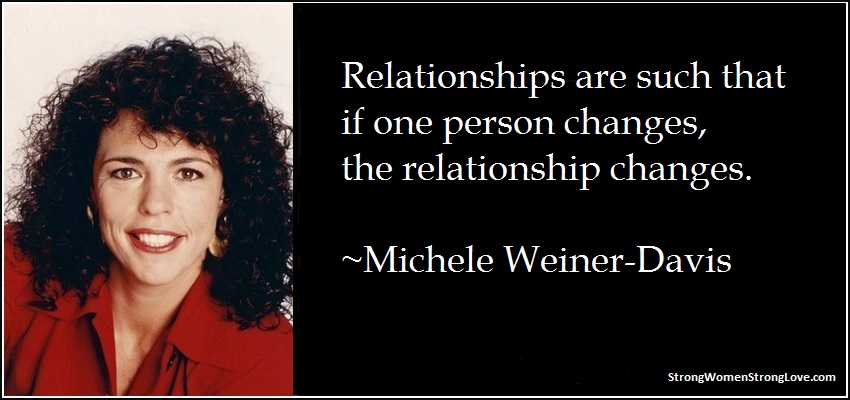by Strong Women Strong Love | Sep 14, 2017 | Poisonous Patterns |

What happened to your relationship?
You and your husband rarely focus on each other anymore. Instead, you’re at work, on your phones or wrapped up in the kids’ activities. You aren’t really sure what’s going on in each other’s lives – and you’re not interested enough to ask.
It’s all so different from when you first fell in love and couldn’t get enough of each other.
If one or both of you are emotionally checked out from your marriage, it doesn’t mean that passion and deep connection are gone forever. But it does mean that it’s time to give your relationship some TLC.
What Happened to the Spark?
There are some good reasons you and your husband were so irresistible to each other when your relationship was new. You gave each other your undivided attention, made each other feel important, and did interesting things together. It probably didn’t hurt that you were also at the mercy of powerful hormones that filled you with desire and made you emotionally open.
But in every lasting relationship, those intense feelings eventually subside. Because novelty eventually wears off, all the things that attracted you to each other at first seem routine now.
On top of that natural evolution, unrelenting work and family commitments can pull you away from each other: it’s hard to connect with anyone when you’re distracted, tired, and just need to decompress.
How to Check Back In
But here’s the good news: Even though passion and connection aren’t automatic anymore in your relationship, they can still flower again with some cultivation. Here’s how to do it.
- Prioritize you marriage. I get it: You have lots of other priorities. It’s hard to find time for your relationship. But it’s imperative that you do. Otherwise, you’re at risk of slipping from distraction into complete disconnection. Investing in your marriage pays off. When your marriage is strong and you feel connected to your partner, it’s easier to face life’s other challenges.
- Change things up. As I mentioned above, one of the reasons people emotionally check out of their marriages is that everything feels routine. Even a small change — like vacationing somewhere new — can reignite a sense of novelty and intrigue. If your husband isn’t game to explore something different right now, do it yourself. The energy you’ll get from taking a class or pursuing a new hobby should rub off on him and get him onboard.
- Get curious. False assumptions about each other might be behind your disengagement in the marriage. For example, maybe it seems like your husband works constantly to avoid time with you. You might be right, but it’s also possible there’s something else going on. Maybe he’s putting in extra time because he’s nervous about his job security. Take some time to plug back in and find out the real stories behind each other’s behaviors. My blog post about curiosity can help you get started.
- Tame your phone addiction. Those little devices can be a huge distraction in a relationship. Your phones make it easy to keep each other at arm’s length. Try some gradual shifts to change your phone habits. For example, make it a point not to glance at your phone when you’re talking with your husband.
- Seize every moment. You probably checked out of your marriage gradually over time. In the same way, rebuilding your connection is also a process. Even if you have just a few minutes each day to focus on your relationship, they can be powerful if you are truly present for each other.
If you’d like to further explore the ideas from this blog post, check out my book Strong Women, Strong Love. It has many more strategies for maintaining a connection with your partner amid our busy, stressful lives.
by Strong Women Strong Love | Jul 13, 2017 | Parenthood, Persistent Pressures |

You’ve married a great guy with wonderful children. The only problem? His ex-wife. She stirs up conflicts over the kids — and sometimes it even feels like she’s trying to win your husband back. So how do you deal with an ex-wife who seems to constantly fan the flames of drama? It takes a lot of thoughtfulness, maturity and grace under pressure.
She’s Not Going Away
Let’s start with a dose of reality. A person you didn’t choose to have in your life now plays a big part in it. That might not feel very fair. But, because she and your husband share children, she’s going to be a presence in your world for a while.
As you deal with his ex-wife, it might help to understand the emotions behind her hard-to-take behaviors. She may still be upset that your husband chose to leave their relationship. Even if she was the one who ended their marriage, she may be jealous of the fact that he’s moving on. She may feel insecurity about your being “the other woman” in her kids’ lives. Or she may fear that you’re competing with her or her kids for your husband’s time and financial resources.
It’s not on you to call her out if you suspect any of these issues. But realizing that she’s acting so badly out of hurt and fear — instead of just pure spite or evil — helps you navigate from a place of composure and compassion so that you don’t compound the negativity she creates.
If you have to interact with her in person, a good rule to follow is to try to show the same respect and friendliness you would to a stranger — for example, someone waiting in line with you. But as you resolve to act respectfully, you also have to prepare yourself for the fact that she might not return your kindness and maturity. That’s her problem. Just focus on being the bigger person. She may not appreciate it, but your husband certainly will.
Putting the Kids First
Resentments and power struggles between former and current spouses can play out in conflicts over the kids. You might cringe at the idea of your husband having any interactions with his ex, much less co-parenting with her. But remember that it’s in the best interest of your step-kids if their parents can work out issues together.
If your husband’s ex is making you the bad guy in disagreements over the kids, it can ease some tension to make sure he has primary responsibility for the kids when they’re with you, especially when it comes to discipline. You and your husband may also need to have a clear understanding of where to set boundaries in the relationship the two of you have with his ex. For example, if she’s calling you names or being disrespectful in some other obvious way, some clear limits may need to be set. The two of you will have to decide whether that’s best done by you or your husband. Of course, these decisions are best made when you’re calm and rational.
Also remember what we talked about it earlier: The idea of someone else acting as “mom” to her kids might be driving her crazy. Honor the relationship your stepkids have with their mother. Everyone – you, the kids, your husband, his ex – should be clear that you’re adding to the kids’ family, not replacing their mother in anyway. Hopefully, she’ll realize at some point that her children can only benefit from having more people who love and care for them. But it’s easy to be territorial, especially when a blended family arrangement is new.
Your Husband, His Ex
It’s possible for your problems with his ex to go beyond co-parenting disagreements. If his ex is acting in ways that feel like a threat to you marriage, that’s especially hard. Your anxiety about her (which, of course, she might be trying to provoke) can easily sow mistrust and discord that harm your relationship, so be careful.
Remind yourself that your husband is married to you now — and that there’s a reason he’s no longer married to her. Don’t let your fears take over. Trust him, and remind him of that trust. If the ex pushes your buttons to the degree that you can’t even talk about her with your husband, think about how to work with your emotions so that you can get to a calmer place. Managing your family’s relationship with her should be something you and your husband can communicate about.
Will Things Get Better?
Blended families may require a greater degree of thoughtfulness and intention. However, there is no rule that conflict has to be the norm. Plenty of parents work collaboratively and even amiably with former spouses, but it requires the adults involved to be mature and compassionate. Will you commit to doing your part to create the best environment for everyone involved, especially the kids?
by Strong Women Strong Love | Feb 28, 2017 | Parenthood, Poisonous Patterns |

It’s a crossroads that countless couples have encountered: Their marriage has become unhappy and unsatisfying. But they fear hurting their children by divorcing.
Should you stay in your marriage for the kids, or end it? Both choices are painful. Which one is better?
Each couple has to ultimately decide what’s right for them and their family. But I do believe there’s a wise way couples can approach this life-altering decision.
A caveat before I go on: This advice is for people in unhappy marriages, not relationships that are marked by abuse and aggression. If you’re in a situation like this, please seek professional help.
Have You Given Your Marriage a Real Chance?
For most unhappy couples, the decision about ending a marriage when kids are involved isn’t so clear-cut. You may long for an escape from your marriage, but you also know the stakes are high for both you and your children. A divorce can complicate all your lives for years. And no matter what you decide, you and your husband will still have to co-parent.
Because divorce is a serious decision, it’s not one that you should rush into. Especially since some studies have shown that a good percentage of people who divorce end up regretting their decision.
That’s why my advice to most couples on the brink is to make sure that they’ve done everything they can to save their marriage before calling it quits.
Using the Research on Marriage to Help You
If you’re intent on working on your marriage, there’s very good news. Research has given us clear insight about what makes marriages succeed or fail. If you are determined to give your relationship a chance, you can be smart and focused in your approach. If you’re both willing to put in the work — reading books, getting therapy, going to marriage workshops — you have a better chance than ever of salvaging your relationship.
Have you educated yourself about what makes a marriage work? Do you know about the four horsemen and the best predictor of divorce? If you don’t know what I’m talking about, then you have some work to do.
As a parent, if you do divorce, you want to be able to honestly tell your kids that you did everything you could to try to make the marriage work.
Sadly, not every marriage can be rescued. If that’s the case for you and your husband, you’ll at least have the peace of knowing you were thoughtful in making the decision to divorce, and that it is really the better option for you. You’ll move forward with fewer “what ifs” and regrets. And the efforts you put in should help the two of you with your post-divorce relationship as co-parents to your kids.
If you are looking for ways to work on your marriage, I want to point you toward my book Strong Women, Strong Love. I wrote it to help busy couples nurture their marriage amid their stressed and demanding lives. If you’re ready to seek couples therapy, seek recommendations from people you trust, consult your insurer’s director of providers or browse Psychology Today‘s listing of therapists in your area.
by Strong Women Strong Love | Aug 1, 2016 | Passionate Partnership, Poisonous Patterns |

I recently had the opportunity to hear author and marriage therapist Michele Weiner-Davis speak.
Weiner-Davis is the author of Divorce Busting, among other books. As you can tell from that book title, the heart of her approach is about helping couples avoid divorce if at all possible.
I think her work is interesting and useful. One of Weiner-Davis’ resources that I’ve been sharing with my clients is The Last Resort Technique. It’s something you should read immediately if you feel that your marriage is in serious jeopardy. Weiner-Davis defines this as your husband filing for or definitively asking for divorce, being separated from each other, or still living together, but with little to do with each other.
The steps in the Last Resort checklist align with advice and strategies I’ve written about here in this blog and in my book, Strong Women, Strong Love.
Call off the Chase
As a first step to saving your marriage, Weiner-Davis advises “stop the chase.” That means no calls, buying gifts, etc.
In a past blog post on handling a separation, I wrote about why this strategy works:
If your husband does actually leave the house, don’t pressure him to come back. Allow him to experience the reality of what divorce from you would mean. … Give him space to understand your importance in his life. It’s possible he’s not interested in reconciliation and will eventually want a divorce. It’s also possible that if he truly experiences a separation, he’ll eventually start missing you and the life you have built together.
I’ve also written about how research has shown that a pattern of chasing isn’t good for marriages:
In technical terms, the pattern in which one spouse wants to confront the issue and the other withdraws from such a discussion is the pursuer/distancer pattern. E. Mavis Hetherington’s landmark study of 1,400 divorced individuals found that couples who routinely related this way had the highest risk of ending up divorced.
Rediscover Yourself
The second step of the Last Resort Technique is “Get a life.” Feeling depressed and desperate when your marriage is on the brink is natural, Weiner-Davis writes. But, she says, it’s important to “remember who you really are.” In other words, you’re much more than your response to the current crisis in your life. You’re a whole person, not the “jilted wife” or whatever demeaning label you might be applying to yourself.
Weiner-Davis recommends doing things to get back in touch with yourself, such as deepening your faith, reconnecting with old friends or pursuing a new interest or hobby.
Earlier this year, I wrote about the importance of maintaining a strong sense of self no matter what’s going on in your marriage:
It’s about engaging in what truly makes you feel alive, showing up as yourself, and drawing a line when others don’t respect you. It’s being playful, confident, and engaged in your own life. As therapist Esther Perel has so eloquently noted, distance, space, and mystery stoke the fires of attraction. Be yourself, enjoy doing your own thing, and you’ll amp up the attraction in your relationship. If you’re not convinced, ask yourself how attracted you would be to your husband if he was really needy and had no life outside you! Not much, I bet.
Weiner-Davis makes no guarantees that the Last Resort Technique will save your marriage, but she writes that “it works often enough for you to be eager to give it a shot.” And, she adds, “even if your marriage doesn’t improve … your mental health will.”
If you’re interested in learning more about Michele Weiner-Davis’ Last Resort Technique, consider her new online course, The Last Resort Technique.
by Strong Women Strong Love | Oct 14, 2015 | Passionate Partnership |

It’s the time of year for scary stories, so here’s one for you:
You and your husband have been growing apart for some time. He’s just like your dad, constantly mad about something, and you’re sick and tired of walking on egg shells. You’re convinced you married the wrong man and fantasize all the time about leaving him and starting over with someone else.
After months of contemplation, you finally pull the trigger, and divorce him. You hope you will get a second chance at true love.
Eventually, you meet a man you’re absolutely crazy about. The two of you have incredible chemistry, and he’s everything you feel like has been missing from your life. He’s your dream come true. He’s calm, sweet, and listens so patiently. You date for a few months and decide to marry him.
And then, the honeymoon comes to an abrupt end.
Turns out, he’s not that different from your first husband. Sure, he can be sweet, but he’s also got a really short fuse you didn’t see at the beginning.
How could love have felt so right, but led you back to this awful place again? You feel angry and misunderstood and can’t get this husband to change either. “How on earth did I end up married to the same type of guy again?” you wonder again and again.
There’s an interesting answer to that question — and it is found in Imago Relationship Therapy, developed by Harville Hendrix and Helen LaKelly Hunt.
Imago Therapy is powerful, but it’s not intuitive. In this post, I’ll introduce you to the key ideas of Imago so that you can see whether it could be valuable tool in your marriage.
You May Feel Like It’s All a Mistake
Imago Therapy says that the purpose of romantic love is to attract a person who can help us become whole. Because no one’s parents are perfect, we’re all carrying emotional wounds from childhood that we need to heal. Maybe, you felt neglected as a child and want to feel important to someone. Perhaps, you were constantly criticized or expected to be perfect and need true acceptance.
According to Imago, we’re unconsciously drawn to romantic partners who have the positive and negative qualities of our early caregivers, especially the parent that frustrated or hurt us the most. Why? Because that’s what’s emotionally familiar to us.
In your marriage, you try to get from your husband what you could not get from your parents. If you felt invisible to your caregivers, you want your spouse to make you feel like you matter. Inevitably, you feel invisible around your husband too.
What a nightmare!
When You Want to Walk Away …
Imago therapy says you’re most likely to want to give up on the marriage when your old feelings from childhood resurface, and you feel invisible all over again. The moment when you feel like you’ve married the wrong guy is a pivotal one. You might want to walk away from your husband at this point, but if you do that, you lose out on the chance to finally resolve this lifelong problem. You have to move closer to him to heal and grow.
Although your husband seems like your parents, what you don’t know is that he’s actually the perfect person to unpack your emotional baggage with. Unlike your parents, he actually has the capacity to meet your need to be seen in the relationship.
All the defensiveness and anger is just getting in the way, and the two of you have to figure out how to step out of that.
Going Deeper With Imago
How do you do that? The essence of Imago Therapy is teaching couples how to connect in a deeper way to get past the emotional impasses in their lives. The central focus is getting to know each other in a much deeper way, especially learning more about each other’s childhood experiences and the hurts you’re both carrying around.
By listening deeply to each other’s stories of emotional pain and responding with compassion and understanding, you help each other heal. This is called the Imago Dialogue, and it sounds simple, but is actually very challenging to do. Fortunately, there are many videos and instructions on the Internet to help you learn.
To learn more about Imago Relationship Therapy, and see if it’s a fit for your marriage, pick up a copy of Hendrix’s classic book Getting the Love You Want. You can also try some of the techniques covered in the book, such as:
- Thinking about the experiences that hurt you as a child so that you can start to understand your unmet needs today.
- Looking objectively at your husband’s qualities, especially the ones that initially drew you to him, and considering what you might have to learn from the connection with him. I know it’s hard to believe that the person who’s frustrating you so much might have something to teach you, but that’s often the case. Don’t forget, he’s got something to learn from you too!
- Finding out more about your husband’s early caregivers and identifying the wounds he’s bringing into the relationship too.
Harville Hendrix says, “We are born in relationship, we are wounded in relationship, and we can be healed in relationship.”After the early glow of attraction wears off, being in a relationship almost inevitably pushes your buttons. The important thing is what you do next. If you’re both willing to do the work, the frustrations you’re feeling can be the gateway to a more profound connection with your husband.






